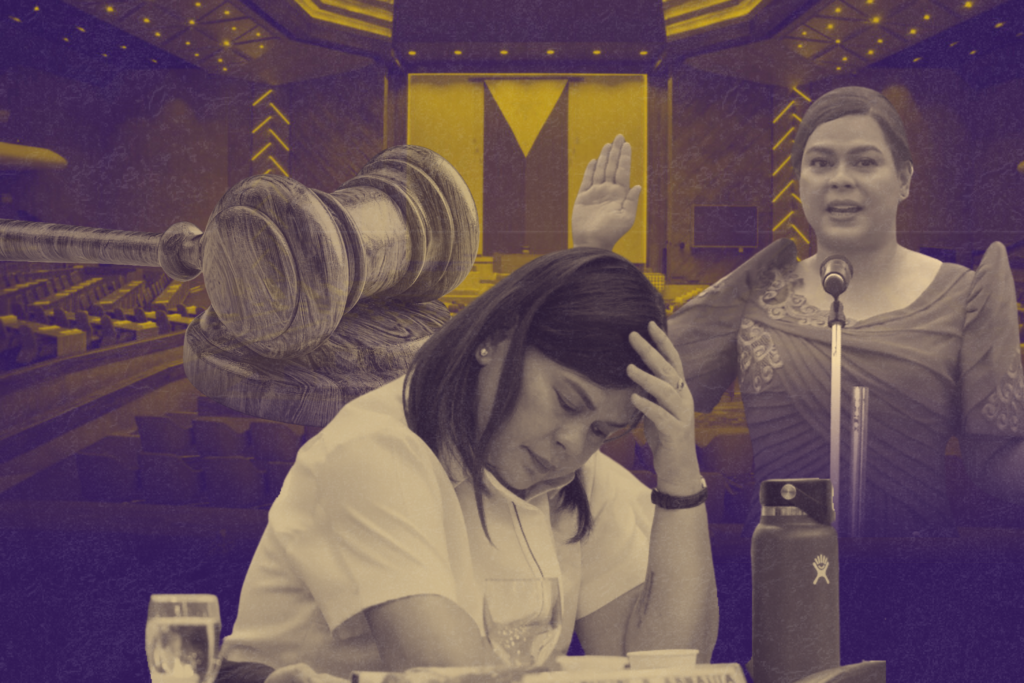Media explain process, identify actors in Sara’s impeachment

CHEERS TO the media reports that provided the necessary context on the impeachment of Vice President Sara Duterte, explaining a complex political process so it can be understood by the public.
On February 5, 215 members of the House of Representatives impeached Duterte, the first for a sitting VP. This number is more than the one-third or 102 votes needed to approve the articles of impeachment.
Reports from GMA Integrated News’ 24 Oras, Inquirer.net, News5’s Frontline Pilipinas, Philippine Center for Investigative Journalism (PCIJ), Philstar.com, and Rappler from February 5 to February 7 discussed the grounds for Duterte’s impeachment, the process and its implications on the upcoming elections. These reports provided extensive background, referring to the Constitution and to impeachment documents to provide historical context to the current political development.
Impeaching VP Sara
Following three impeachment complaints filed by Akbayan, the Makabayan bloc, and a group of lawyers and clergy in December 2024, the House filed its own complaint on February 5, the last day before Congress adjourned.
Media reports cited key elements as the basis of the impeachment: betrayal of public trust, culpable violation of the Constitution, bribery, graft and corruption, and other high crimes.
Dwight De Leon of Rappler reported that while the House’s impeachment complaint is a new one, the arguments in the House version were not new and were a “combination” of the arguments presented in the three earlier complaints. Duterte’s assassination plot against President Ferdinand Marcos, First Lady Liza Marcos, and House Speaker Martin Romualdez and her alleged illegal disbursement of confidential funds are included among the arguments in the impeachment complaint.
Cristina Eloisa Baclig of Inquirer.net referred to Article XI, Section 3 of the Constitution for its listing of the four stages of impeachment: the filing of the impeachment complaint, a House committee deliberation, the House plenary vote, and the Senate trial.
PCIJ’s Carmela Fonbuena and Frontline Pilipinas’ Ed Lingao reported that the impeachment complaint was transmitted to the Senate immediately without having to go through the House committee, since the Constitution allows direct transmittal once a third of the House endorses the complaint.
Both PCIJ and Frontline Pilipinas recalled that the same expedited procedure preceded the impeachment of former President Joseph Estrada in 2000, after then-House Speaker Manny Villar gathered signatures of 115 representatives.
Congress as court
Joseph Morong’s report for 24 Oras described the process after the transmittal of the articles of impeachment to the Senate. He compared the process to a court hearing: Members of the House serve as the prosecution while the Senate acts as the judge that will either convict or acquit the impeached official. Philstar.com added that the 11 representatives acting as prosecutors must be members of the Philippine Bar, and that they need to get 16 votes out of the 24 members of the Senate to secure a conviction.
Citing opinions of legal experts, Morong also pointed to the consequences of conviction: removal from public office and permanent disqualification from holding a public post, including the possibility of facing criminal charges. Morong also cited retired Supreme Court Justice Adolfo Azcuna who said the convicted official could receive lighter penalties such as censure.
Both 24 Oras and Philstar.com reported that if convicted, Duterte would be removed from office, but any criminal charges against her would have to undergo separate judicial trials. Azcuna and Domingo Cayosa, former president of the Integrated Bar of the Philippines, told Morong that the impeachment process is important because its aim is to exact accountability from erring officials. For this reason, both legal experts stressed that the impeachment process should be done as soon as possible.
Impeachment and the elections
In a separate report by Dwight de Leon, Rappler showed how the impeachment trial is not just a judicial process but also a political one.
De Leon reported that most of the incumbent House representatives who are running for the Senate did not sign the impeachment complaint for various reasons: previous and existing alliances with former President Rodrigo Duterte’s political party; in support of President Ferdinand Marcos’ rejection of impeachment for administration bets Camille Villar and Erwin Tulfo; and as an exercise of caution and impartiality should they win a Senate seat and serve as judge, particularly for Tulfo who is currently highly ranked in pre-election surveys.
De Leon noted that Makabayan bloc’s Arlene Brosas and France Castro were the only senatorial candidates who “unsurprisingly” signed the House impeachment complaint, as they had already endorsed the complaint filed by their bloc in December 2024.
Media should continue tracking VP Duterte’s impeachment and be prepared to report whether the trial will uphold its purpose as a mechanism for accountability or be reduced to a potent tool in the game of politics.
Leave a Reply